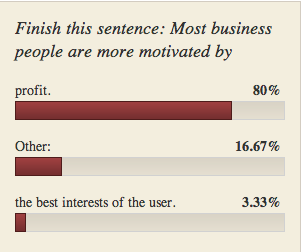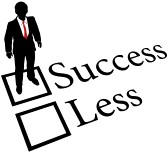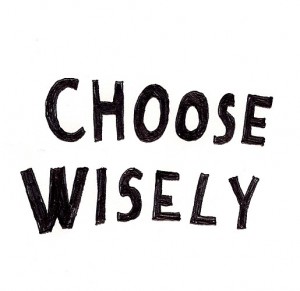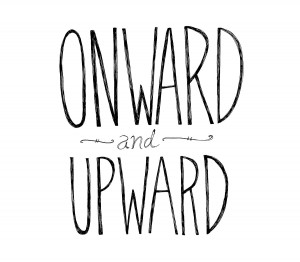“The only way we are going to get recognized for what we do is to make money doing it” ~ Lou Rosenfeld, World IA Day NYC, February 9, 2013
When I heard Mr. Rosenfeld speak these words, I thought to myself “Yes, that’s it! That is the only way that this UX thing can work.”. It’s no secret that information architects and designers are sick and tired of being seen as ‘just the interface people’ churning out deliverables to make our project teams feel productive (whether those deliverables are paper or electronic). We all know that our skillsets are more than just ‘Yes people’, and we are waiting patiently for the day when some one or some thing emancipates us from this stronghold. And up until this moment I, along with many of you, had been racking my brain to couple this complex problem with a simply stated solution. I think that Mr. Rosenfeld brings us just that (Thanks Lou!).
Associating IA, UX and Design with business, and making money doing the things, all the things, that we say we can do and should be doing (instead saying that we should be doing one thing, and only creating the interface) is the way, the ONLY way, for information architects and designers to get recognized for our true expertise. The problem is… none of us really wants to get into the money side of things.

The Current State of UX and Business
It is no surprise that our industry currently sees business and business people as immoral, evil, greedy and only motivated by profit and gain. Businesses and advertisements that profit and gain by taking advantage of consumers are exposed daily in the news. Further, not only do we see this immoral business behavior in the news, but many of us see it within our own companies and project teams as well. Thus, it’s no wonder that when I put out a short, informal, non-statistically based and some would say biased poll (I think I covered all the rants here), that the responses I got were fairly skewed.
In this poll, I asked respondents to finish this sentence: “Most business people are motivated by”. Of the 30 respondents, 24 replied “profit” and only 1 answered “the best interests of the user.”. Other answers I received include “client deadlines and money”, “their own beliefs regarding what is best”, “winning”, “their personal interests”, and “the two are not mutually exclusive”. (A big thank you to all that responded!).

As you can see profit and gain as the motivator for business people was far and away the winner, and I agree with this notion. I also most definitely agree with the idea that user interests and profit and gain are not mutually exclusive options, and that is part of the point of today’s post. As architects and designers, hell as people, we tend to view profit and gain as greedy and evil, as the opposite of helping our users. But, who said that profit and gain is wrong? In fact, profit and gain can be quite good! For instance, we all love Apple products. They are not only beautiful but they make our lives easier, better and more delightful. You can bet your bottom dollar (pun intended) that Apple profits and gains from our consumption, and yet we still love them for it! But that same emotion is not garnered for a rival company… let’s say Microsoft. Microsoft makes similar products to Apple, but the love for them is not nearly as strong. In fact that company is construed as ‘only in it for profit and gain’, and that makes them… evil.
We should ask ourselves, what makes Apple a good business in our eyes and Microsoft a bad business if both are motivated by profit and gain? We can say that we support Apple because in return for the profit and gain they get, they provide us actual value. Apple has, in essence, earned their profit, whereas, in most cases, Microsoft has not. With this example, we can see that being motivated by profit and gain in and of itself isn’t morally bad, it is when you are motivated by profit and gain without giving value in return you are acting immoral. More, because we usually only hear about profit and gain in these evil business scenarios, we start to associate being motivating by profit and gain as evil. Lastly, because we see profit and gain as evil, and because businesses and business people are motivated by it, we then associate business and business people as evil too.
Whew, ok, let’s get to the point here. The 24 people who said that business people are motivated by profit were right. And we, as a community must not see this motivation as wrong, or our business partners as evil, because that is holding us back in a big way.

The Problems with Viewing Business as Evil
Perhaps the biggest problem that we face when we view business and its hunt for profit as evil, is that we as designers and architects separate ourselves from our businesses and business teams. We see ourselves in opposition to them instead of thinking of ourselves as their advisors and partners. They want profit and gain (bad for our users), we want delightful experiences (good for our users), and this must mean that we aren’t like them. Thinking this way means that we don’t see our businesses for what they are, the organizations and systems that we are hired to help and support because they are the ones providing a good or service that will make our users lives better.
This separation and opposition holds architects and designers back because it 1) prevents us from seeing ourselves as business people which 2) means that we can’t get better at being business people which means 3) we have to continue to work for the bad companies in order to ensure an income because we are scared to leave these jobs or to start our own awesome businesses.
If only we were armed with business knowledge we’d understand the economics behind this and then we could strike out on our own or to better places with real experience work. But, alas, we’d rather keep up the UX and Business divide. We’d rather push back on the idea that we, too, are business and as such should learn more about business to be better. But, let’s face it, you are a business person too!
A businessperson (also business person, businessman, business man, businesswoman, or business woman) is someone involved in a particular undertaking of activities, commercial or industrial, for the purpose of generating revenue from a combination of human, financial, and physical capital. ~ Wikipedia
You may not rack up numbers, create product goals, attend board meetings, or wear suits to work, but work designing and architecting for good user experiences… i.e. Experiences that generate more company revenue, is what you do.

Shunning this fact prevents us from learning more about and understanding business. And business, is what drives our economy, feeds us and our families, and provides us homes. When we don’t understand business, we have to become more dependent on the “business people” (both good and bad) to make money for us and to pay us (and our bills). This setup, one in which only the “real” business people know how to be fiscally successful, makes it even harder for those of us working for the bad business people to leave to find morally good work that is UX based.
And finally, if we don’t associate ourselves with and better understand business, we can’t negotiate better work or start our own companies that do great work. Meaning, we will never, ever really make money doing what we say we should be doing (facilitating experiences that are delightful, doing real ethnographic research, creating useful research based personas, need I go on?)… and therefore we will never be recognized for that really fun, awesome, valuable stuff that we should be doing.. aka we’ll still be only involved in the interface.
Solutions
It may be obvious to you at this point, but the first steps that we should take to combat our separation from business is to 1. See that each and every one of us is “in business” and 2. Realize that the occupation of business is moral, noble and worthy. As Rabbi Daniel Lapin writes in his book Thou Shall Prosper – Ten Commandments for Making Money, most people believe that business is inherently bad, but as we saw above, this is not the case. In fact, it is time to start seeing business for what it really is: The way that we create and exchange valuable goods and services that people want and need. And, doing this in a way that upholds morals and virtues, while still making a profit, is not only morally good, but it is the entire point of not only a successful business, but of architecting and designing for delightful user experiences! Therefore, not only are we business people, but we aim to be great business people who stay moral, nobel, and worthy by advocating for our users, while matching their needs with business needs.

Outcomes
The outcomes of us realizing we are business people, and seeing that business and profit can be good (if done through moral means) are us not only closing the gap between UX and business, but making it almost invisible. This enables us to be not only user advocates for good businesses, because we know more about business and don’t fear losing or changing jobs as much, but can even help us decide to start our own morally good businesses with IA, and great UX as the output of great IA, at the forefront! In either case, knowing more about business helps us to do what we say we should be doing, what we want to be doing to really provide value. It helps us to not only do the work, but to make money doing it, so that we can be recognized for our true value and not for our software manipulation skills only.
I’ll leave you with this…
The only way we are going to get recognized for what we do, for the value we know we provide, is to make money actually doing the things we say we should be doing. The only way to get to do those things is to learn more about, and get closer to business. It is your choice which path you go down, but I recommend the business path… otherwise plan on keeping that Omnigraffle file open.












